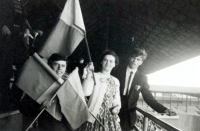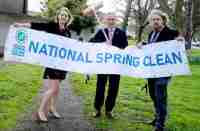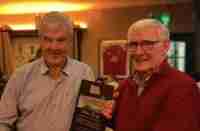25 years on – and needed more than ever
The Western Alzheimers Foundation, which covers Mayo, Roscommon and Galway is 25 years old this year. The man who set it up all those years ago is John Grant.
John lives in Claremorris but is a man who has plenty of Roscommon roots. The organisation now has care facilities in Ballindine, Co. Mayo and in Athenry, Co. Galway – and there are plans for further facilities in Mayo and in Roscommon.
The head office of Western Alzheimers is in Ballindine and there are offices in Roscommon town and in Galway. John Grant was the CEO of Western Alzheimers until his retirement earlier this year. The new CEO is the joint manager of the Mayo football team, Pat Holmes.
As the Irish population lives longer, Alzheimers and Dementia are going to become even more common and the demand for services will increase.
In fact County Roscommon has the highest incidence of Alzheimers disease in the country pet head of population. John Grant is married to Maura and they have three grown-up children. Last week Seamus Duke met with John Grant to find out how he started Western Alzheimers and to hear about its development.
‘Roscommon has highest incidence of Alzheimers in country’
Recently retired but still passionate on the subject, John Grant reflects on 25 years of Western Alzheimers
SD: So, how did Western Alzheimers get started?
JG: My wife’s father developed Alzheimers in 1980. When he was diagnosed with it we – or anyone else – hadn’t a clue about it. There was no information about it either. The family looked after him at home and I saw how hard that was. There was no help for them, in how to look after him. My wife’s mother looked after her husband and it was very hard going (for her). I thought that I would try to do something about it.
SD: What did you do in response?
JG: In October 1990, I saw a programme about Alzheimers on UTV and after that I decided to hold a public meeting in Claremorris. It was absolutely packed with people. So we decided to hold a meeting once a month after that and it was extraordinary just how little people knew about this disease and how common it was.
Everyone who was looking after someone thought it was just them that was affected and they never realised that there were so many people suffering. There was a lack of information. People might think at some stage that their loved ones might be getting better, but in reality they do not get better.
In fact they get worse as time goes on. We held those meetings for two years and then we started in Castlerea. Then we started meetings in all three counties – Roscommon, Mayo and Galway. People came together and chatted about their problems. It was a great start.
Then the whole notion of having time for themselves away from the caring came up time and time again. It was a big problem, because most Alzheimers’ patients need 24/7 care. We looked at different aspects of all that.
In 1994 we looked at day care, which was not an option at the time, because there was not near as many patients as there are now. We looked at respite care, but we had no money, or at least only very limited funds that we had from fund-raising.
We then got a FAS scheme going, firstly in Mayo and then in Roscommon and Galway, and I must say that the late Sean Doherty TD was very helpful to us in getting that going. So that was the start of the in-home support.
Then in 1996 two people from the health board came to me and said ‘if you want to set up respite care we will back you with funds’. They wanted me to do a feasibility study or rent a house immediately. I took the option of renting a house and we did that in Claremorris.
We had three people to start with. The whole idea of respite care was new to people. In fact the first person we had in for respite care was a lady from Roscommon and she sent her mother in. We started with a ‘five days and nights’ service and it quickly went to seven days and nights a week.
The one thing that we stressed was that the people who came into us for care were all individuals. They all have their own personalities and their own way of going on.
SD: What is the biggest problem that people face when they are caring for someone with Alzheimers?
JG: Time is the biggest problem. It is a ‘24 hour a day seven days a week’ job. You might be caring for someone that you have been married to for 40 years or more and you are watching them deteriorate and at a stage they will not even know who you are. That can be very hard on people.
For instance we had a man from Roscommon whose wife was showing him their wedding album, and while he recognised some of the people in the album, he didn’t recognise his wife sitting there beside him. He knew who his wife was in the album but he couldn’t relate that to the woman sitting beside him showing him this album. It can be very sad that way.
SD: So you have great respect for carers?
JG: Yes definitely. They do this job 24 hours a day seven days a week, often without any pay at all. At times where there is a big family frequently I see that they all have their say but often it is left to one person to do the caring – and that is stressful. But there are fantastic people out there.
SD: How did the organisation expand?
JG: We were very short of funding…in 1996 we decided we would have to expand and build our own unit.
Dr Tom Moffat was junior minister for health at the time and I said to him that if he could get us 150,000 pounds we would build. In fact he got us a grant of 192,000, which was great.
We opened the facility in Ballindine in 1999 and it cost us 450,000 pounds – and we had it all paid off within two years. We were worried at the time about whether or not we’d be able to fill it…now it is not nearly big enough with the big increase in the number of patients with Alzheimers.
We started giving respite to 12 people at any one time and it might be for a day or two or a week or even two weeks. If there was a family wedding or event like that it would be ideal.
SD: How was/is the organisation funded?
JG: We got a yearly grant from the Government but it was not nearly enough to keep the show on the road…fund-raising was always vital and we were on the road day and night over the three counties raising money all the time. It had to be done.
I loved going around meeting people. We met so many very generous people over the years who ran functions and fundraisers for us to keep it going. I have attended a lot of functions over the years and I enjoyed every one.
SD: Why did you retire?
JG: Well, I was at it 25 years but I found that the huge amount of new regulations and rules and standards was hard to deal with for me.
It’s not that we were doing anything wrong but there seems to be more emphasis on the filling of forms now than (on) care and this organisation is all about care as far as I am concerned. I know that bodies like HIQA are care-orientated too but everything is so rigidly enforced now.
The whole scene has changed really and I was working at it for 25 years and I have three grandchildren now and I’m nearly pension age so it was nearly time to stop. The one thing that we were always in Western Alzheimers was people-centered and a hug and a smile was always very important.
We set up an ethos of care that is copied in a lot of places now and I find that the rules and regulations that might apply in a normal nursing home may not be suitable for the treatment of Alzheimers patients. I got frustrated by it in the last couple of years. I was lying awake at night worrying about it and at my stage of life it’s not worth it really, so I decided I’d step back.
SD: Tell me about the services that Western Alzheimers have in County Roscommon specifically.
JG: We have an in-home support service in Roscommon and we have an office in Roscommon town and the ladies there, Noleen and Deirdre, go out and meet people and assess the needs of the patients.
We have a lot of people who use the home in Ballindine. Roscommon has the highest incidence of Alzheimers per head of population in the country and the numbers are going to grow and grow as people live longer.
SD: So what would you like to do now that you are retired?
JG: I’d like to get back to chatting to carers at meetings – I would like to be out doing information meetings for people. A lot of people hear from their doctor that their loved one is suffering from Alzheimers but they don’t know where to go.
I have accrued a lot of knowledge over the years and I’d like to share that with people. I know what it’s like to be a carer and I understand what they are going through. My advice to people who are worried about Alzheimers is that they are doing so without any reason.
People think that if they forget a few things in everyday life that they are in bother (i.e. may have early onset of Alzheimers) but I always say at meetings that if they remembered to come to the meeting and turned up at the right time and went to the right place and knew how to get home then they are alright.
People worry too much about Alzheimers. It’s not about forgetting where you left your keys. If you are putting on your clothes back to front or putting your shoes into the fridge then you are in bother and need help. Everyone is so busy now that it is hard to be remembering everything, but again (failing to remember things here and there) is not Alzheimers.






